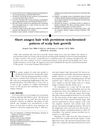TLDR Many products for hair re-growth exist, but a perfect treatment without side effects has not yet been found.
The document from June 2011 reviews the causes of hair loss and the various agents that promote hair re-growth, noting that over 40% of men over 30 and a significant number of women are affected. It discusses the hair growth cycle, factors contributing to hair loss, and lists both natural ingredients and pharmaceutical agents used as hair growth promoters, such as Swertia extract, vitamin E, Minoxidil, and Finasteride. The review also outlines methods for evaluating hair growth promoters, including tissue culture and studies on animals and human volunteers. It concludes that while many products are available, an ideal hair growth molecule has not been developed, and existing treatments like Minoxidil and Finasteride can have side effects. The document highlights the ongoing research to find new molecules for hair growth without adverse effects, using various study methods, but does not provide specific results or conclusions from these studies.
 87 citations
,
March 2005 in “Journal of Dermatological Science”
87 citations
,
March 2005 in “Journal of Dermatological Science” Asiasari radix extract promotes hair growth and increases protein synthesis and cell proliferation.
25 citations
,
July 2004 in “Experimental Dermatology” Illicium anisatum extract may boost hair growth.
 128 citations
,
September 2003 in “Journal of Ethnopharmacology”
128 citations
,
September 2003 in “Journal of Ethnopharmacology” Hibiscus rosa-sinensis leaf extract helps hair grow longer and faster.
 59 citations
,
August 2003 in “Phytotherapy Research”
59 citations
,
August 2003 in “Phytotherapy Research” Ginseng, especially red ginseng, helps hair grow by increasing blood flow and energy to hair roots.
 75 citations
,
October 2002 in “Journal of Dermatological Science”
75 citations
,
October 2002 in “Journal of Dermatological Science” Sophora flavescens extract may help hair grow by affecting growth factors and blocking a hair-related enzyme.
90 citations
,
January 2002 in “Dermatology” Kenogen is a resting phase in hair follicles that may contribute to baldness, especially in androgenetic alopecia.
231 citations
,
December 1999 in “Journal of Investigative Dermatology” Hair follicle size is mainly influenced by the number of cells and extracellular matrix volume, with cell number having a larger impact.
 1113 citations
,
August 1999 in “The New England Journal of Medicine”
1113 citations
,
August 1999 in “The New England Journal of Medicine” Hair follicle biology advancements may lead to better hair growth disorder treatments.
64 citations
,
October 1998 in “Acta dermato-venereologica” Grape seed proanthocyanidins can promote hair growth.
 68 citations
,
March 1965 in “The BMJ”
68 citations
,
March 1965 in “The BMJ” Hormones and genetics affect hair growth and patterns, with some changes reversible and others not.
 3 citations
,
December 2020 in “Journal of Cosmetic Dermatology”
3 citations
,
December 2020 in “Journal of Cosmetic Dermatology” Fat injections can help regrow hair in stubborn hair loss cases.

Baldness is often hereditary and linked to male hormones, becoming noticeable when half the hair is lost.

Some treatments like minoxidil, finasteride, and surgery can help with hereditary hair loss.
 16 citations
,
October 2003 in “Journal of The American Academy of Dermatology”
16 citations
,
October 2003 in “Journal of The American Academy of Dermatology” A boy had unusual synchronized hair growth with short active growth phases, not fitting known hair disorders.
July 1994 in “Archives of Dermatology” The book provides a thorough guide on hair and scalp diseases, covering causes, types, and evaluation methods.
189 citations
,
May 1991 in “Medical Entomology and Zoology”










